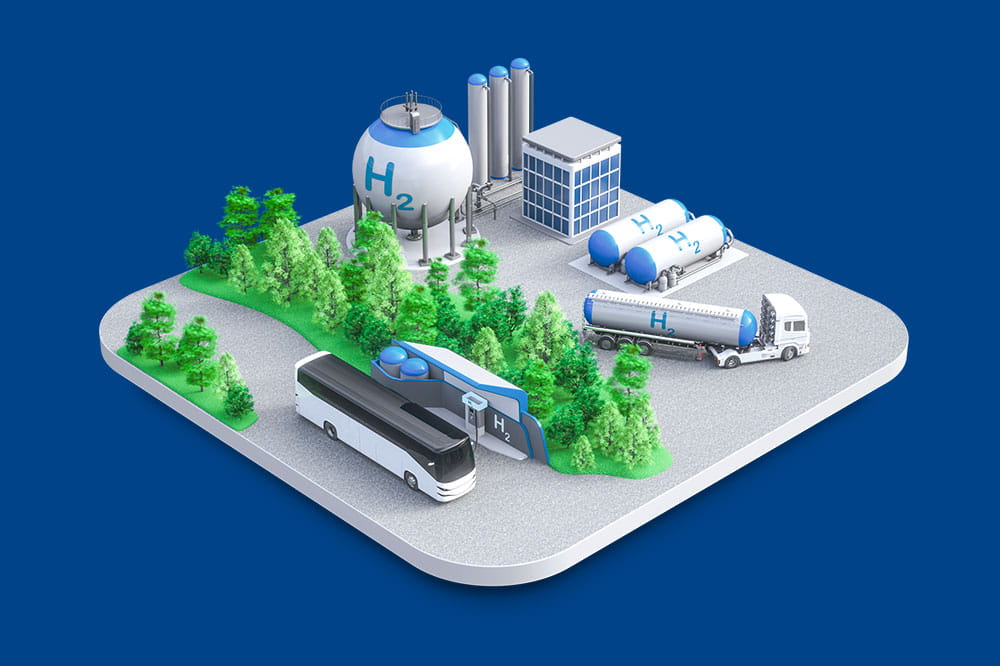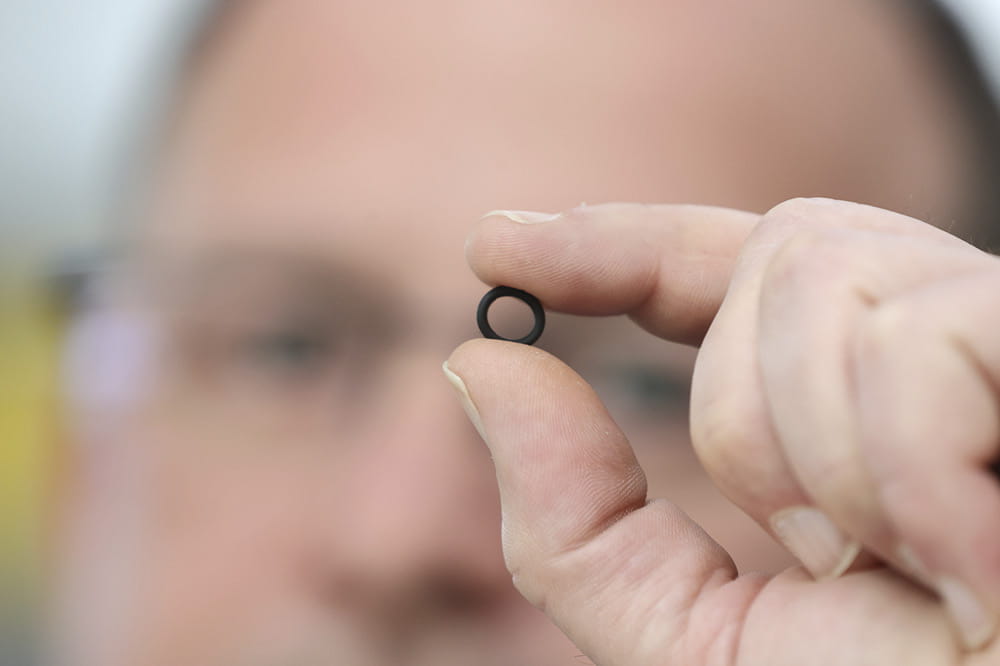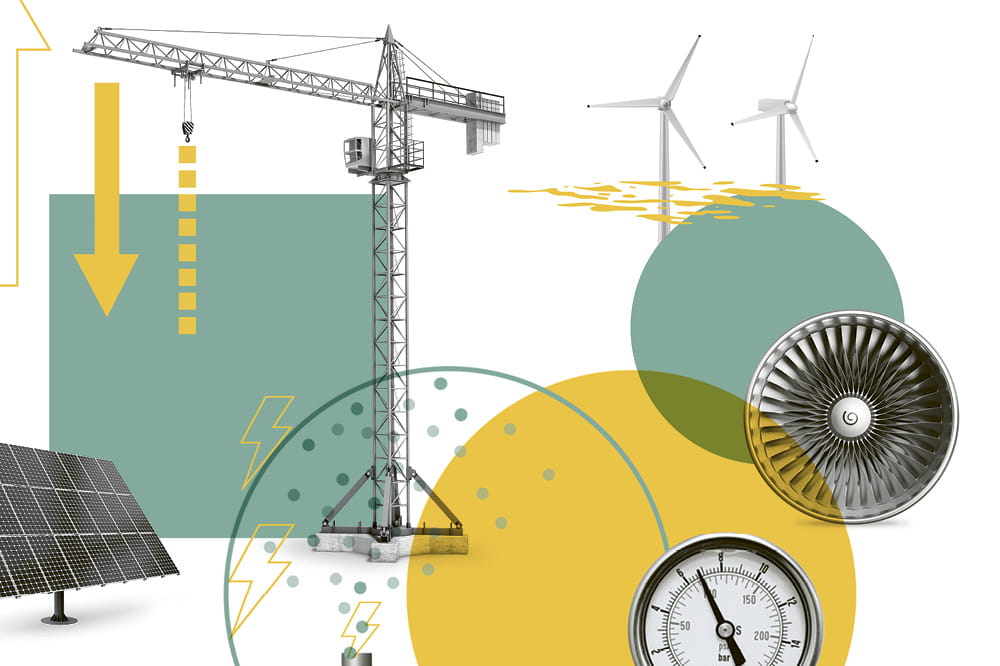Obtain news and background information about sealing technology, get in touch with innovative products – subscribe to the free e-mail newsletter.

Hydrogen Times Two: Seals for Fuel Cells and Hydrogen Engines
Alternative powertrains are designed to enable climate-friendly mobility. There are great hopes for hydrogen as well as battery-electric drives. The possibilities for hydrogen-fueled vehicles include both fuel cells and internal combustion engines. Freudenberg Sealing Technologies can provide sealing solutions for both.
“Series-production hydrogen combustion engines will be making their way into heavy-duty transport and buses,” said Prof. Eberhard Bock, Freudenberg Sealing Technologies’ Vice President of Technology and Innovation. Since fuel cells are the rage right now, his opinion may sound bold. But engine manufacturers also believe it. After all, many well-known makers of internal combustion engines are developing hydrogen engines. The reason is clear: It is a promising technology, and none of these companies want to lag behind their rivals when the hydrogen economy takes off. Suppliers are supporting development processes with appropriate products. The idea is for hydrogen to join diesel and gasoline as fuels for combustion engines.
We have always found sealing solutions for tricky situations. Whether for combustion engines or fuel cells.
Prof. Eberhard Bock, Vice President, Technology and Innovation at Freudenberg Sealing Technologies
Modification of the Internal Combustion Engine
Ultimately, the basis is being laid for something that, upon closer inspection, seems quite logical. After all, the foundations are already in place. “The potential for the hydrogen engine lies in the experience with the traditional combustion engine,” Prof. Bock said. It has been manufactured for more than a century and is considered mature technically. “There are enough experts and expertise to develop and optimize hydrogen engines with comparatively little effort,” said Prof. Bock, who is an honorary professor at the Technical University of Kaiserslautern. In any case, engine manufacturers in Germany and the United States have recently introduced powerful models and are working toward series production. In the process, they are using components that they can readily take from conventional combustion technologies. Meanwhile, they were and still are required to adapt components such as cylinder heads, pistons, piston rings and the injection system to hydrogen. Among other things, they must consider that temperatures in certain areas of hydrogen engines can be higher than in diesels.
Technological openness: Whether the option is the hydrogen engine or the fuel cell: Prof. Eberhard Bock, Vice President, Technology and Innovation at Freudenberg Sealing Technologies, welcomes any powertrain that is sustainable.
Existing production facilities are another factor favoring the manufacture of hydrogen engines. They can be converted for H2 combustion engines with reasonable investments. Supply chains and the availability of materials are also well-established, and rare materials are not required. Hydrogen engines presented recently achieved about 300 kilowatts and more than 1,000 newton-meters of torque. That is sufficient for engines for farm and construction machinery. They are also under consideration for stationary equipment, in cogeneration plants and as emergency power generators, for example. Engines with up to 1,000 kilowatts and 5,000 newton-meters are already under development. These 12-cylinder engines have displacements as high as 50 liters and are expected to be used in mining.
Advantages of Hydrogen Powertrains
Compared to vehicles with battery-electric drives, hydrogen fueled engines score high in several key categories. The price for hydrogen powertrains is expected to be less, even if their maintenance will cost more. Vehicles with H2 combustion engines weigh less, they can be fueled more quickly, and their range is greater. And once a large-scale hydrogen infrastructure including a refueling station network has been established, the sales opportunities for passenger cars with hydrogen powertrains will expand as well.
On the other hand, the efficiency of a hydrogen engine is comparatively low. Efficiency indicates how the amount of usable energy compares to the energy investment. It is as high as 85 percent for battery-electric vehicles. In contrast diesels come in at nearly 50 percent, although a Chinese manufacturer recently created a stir with an efficiency rate of 53 percent. The hydrogen combustion engine achieves a bit more than 40 percent, with the potential for more. The efficiency of a hydrogen-powered fuel cell is more than 60 percent.
Hydrogen Unimog
Daimler Truck has recently introduced a Unimog with a 290 horsepower hydrogen engine. The vehicle has already demonstrated its performance in everyday operation. Daimler Truck worked with 17 partners to develop the engine as part of the “WaVe” project supported by the German Federal Ministry for Economic Affairs and Climate Protection. “WaVe” deals with hydrogen-based combustion engines for the medium-duty class. The hydrogen engine also powers the work machines attached to the Unimog. The example shows that vehicles with hydrogen technology can be used much like those with diesel engines. Only slight adaptations are required. Seals from Freudenberg Sealing Technologies are installed in the Unimog’s hydrogen engine.
Headerbild: Copyright Daimler Trucks
Openness to Sustainable Drive Technologies
Whether the subject for discussion is fuel cells or hydrogen engines, Prof. Bock recommends openness to the technologies. “Any sustainable powertrain ought to be welcome.” In the case of hydrogen drives, this requires the green production of hydrogen. The fuel cell has now become a highly developed technology. With the advantages of fast fill-ups and greater ranges. The technology has found a market in heavy-duty transport, logistical vehicles and buses. “At Freudenberg Sealing Technologies, we have long dealt with sealing solutions for various types of powertrains. We are helping manufacturers with the joint development of outstanding solutions and with standardized products,” Prof. Bock said.
Clean energy: Waste collection vehicles like these are propelled by fuel cell technology in North Rhine-Westphalia. © Alamy/imageBROKER/Jochen Eckel
Sought-after, High-performing Materials
Well-known manufacturers and suppliers naturally turn to Freudenberg Sealing Technologies on questions relating to sealing technology. Not least of all, because success essentially comes down to using the right material along with process reliability and expertise in product design. “We have found sealing solutions for tricky situations again and again, whether for combustion engines or for fuel cells,” Prof. Bock said. “We have patents for materials that are tried-and-tested and high-performing in equal measure, and that gives us an advantage.” One example in the fuel cell field is Fuel Cell Polyolefin (FCPO), which has already found a home in series production. Unlike popular rubber compounds, it gives off no pollutants. That’s good for the fuel cells as they are very sensitive to these influences, which tend to depress performance. There is another issue: Even the tiny, volatile hydrogen molecules only migrate very slowly through this long-lasting, heat-resistant material.
Another FKM-based material that was developed in-house has surged onto the hydrogen-engine scene. It copes well with temperatures up to 200°C, which destines it for H2 combustion engines. It is also as durable and resistant to permeation as FCPO, coupled with a high resistance to fluids and acids. Each of these traits permits its use in components, like the injection system, that are expected to be modified.
Any sustainable powertrain ought to be welcome.
Prof. Eberhard Bock, Vice President, Technology and Innovation at Freudenberg Sealing Technologies
Companies Propose and the Politics Follow
Prof. Bock still sees a key role for the political leaders in giving hydrogen powertrains a critical mass. “It will be up to them to get the infrastructure for the hydrogen economy up-and-running quickly and decisively.” This is especially important from an international standpoint: Many countries are taking on hydrogen projects and building up production and distribution systems. “Whether in Australia, the Far East or North America, a lot of money is flowing into hydrogen projects in a range of locations. We in Germany have to make sure we don’t miss the boat. We have a lot of good ideas, but we are still implementing them too slowly.”
It will be crucial to be ambitious – and stay on the ball, all the more since people have underestimated the amount of effort and the time available for the implementation. It will come down to stamina. That is the only way the energy transition will succeed. The same is true for the decarbonization that will bring carbon-free transportation. “Our climate consciousness must be our greatest engine,” Professor Bock said. “The government must provide incentives to make sure this happens in every field. Some examples are a high CO2 tax, subsidized green hydrogen and the promotion of a comprehensive hydrogen infrastructure.”
Engine manufacturers and suppliers like Freudenberg Sealing Technologies are already developing viable solutions for hydrogen powertrains and are continuing to refine them. Because how did Prof. Bock put it? Hydrogen combustion engines are on their way. After all, their advantages are obvious.
The Future Is Hydrogen
From H₂ Production to Usage: Comprehensive Insights on Production, Distribution, Storage, and Future Applications with Solutions. Explore full spectrum in our webspecial!
Hydrogen Webspecial open_in_newMore Stories About Renewable Energy

Join Us!
Experience Freudenberg Sealing Technologies, its products and service offerings in text and videos, network with colleagues and stakeholders, and make valuable business contacts.
Connect on LinkedIn! open_in_new












